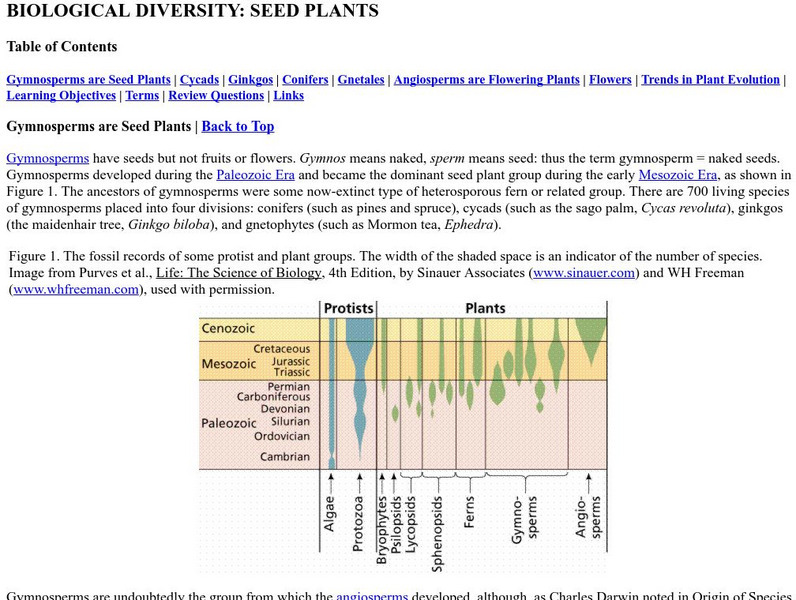Khan Academy
Khan Academy: Animal & Human Viruses
Learn about viruses of humans and other animals, the Baltimore classification system, and the HIV life cycle.
Biology Corner
Biology Corner: Cladogram Analysis
A lesson plan where students analyze a cladogram to understand a derived characteristics between a group of organisms. After analyzing the prepared cladogram, students create their own.
Estrella Mountain Community College
Online Biology Book: Biological Diversity: Seed Plants
An in-depth reference explaining the role of seed plants in biological diversity. Photographs and labeled diagrams help learners with understanding.
Estrella Mountain Community College
Online Biology Book: Biodiversity: Nonvascular & Nonseed Vascular Plants
Photographs, informative tables, and illustrated diagrams help explain the diversity of the plant kingdom in this college-level textbook.
University of Illinois
University of Illinois Extension: Urban Text: Adventures of Herman the Worm
WORMS- What are they? Where did they come from? If you are interested in Herman the Worm's family tree (biologically speaking), his body structures, or all the facts about him that you'll ever need, go to "The Adventures of Herman the...
CK-12 Foundation
Ck 12: Biology: Fungi Classification
[Free Registration/Login may be required to access all resource tools.] Discusses how fungi are classified.
Wikimedia
Wikipedia: Binomial Nomenclature
Wikipedia, an open-source encyclopedia, offers great information on the classification system used in Biology. Covers the benefits of the system, history, and general information on the whole system together.
Other
Alternative Classifications of Life
The Linnaean system (1758) classified all macroscopic living organisms as either Animals or Plants, based on whether they moved [anima, with a soul] or not. Thus, Fungi were included as plants. With the invention of the microscope and...
National Center for Ecological Analysis and Synthesis, University of California Santa Barbara
University of California: George Cuvier
This site from the University of California discusses the contributions and ideas of George Cuvier related to classification, evolution, and catastrophism.
BiologyWise
Biology Wise: Diatoms Facts
Provides information about diatoms, including their physical characteristics, where they can be found, their classification, how they reproduce, how they form diatomaceous earth when they become fossilized, and their importance to...
BiologyWise
Biology Wise: Spirogyra Facts
Provides information about Spirogyra, a type of algae. Discusses characteristics, classification, cell structure, method of reproduction, and life cycle.
Tree of Life Project
The Tree of Life Web Project
The Tree of Life Web Project contains information on living organisms including their history and characteristics. Over 3,000 web pages are linked together uniting all living things.
Teachnology
Teachnology: Science Lesson Plans
Great lesson plans covering a wide-range of science-related subjects. A wonderful resource for wonderful teachers!
CK-12 Foundation
Ck 12: Life Science: Organization of Living Things
[Free Registration/Login may be required to access all resource tools.] When you see an organism that you have never seen before, you probably put it into a group without even thinking. If it is green and leafy, you probably call it a...
Other
New World Encyclopedia: Abnormal Psychology
Explains what the field of abnormal psychology covers, its historical roots, the different models used in the study of mental illness, the Diagnostic and Statistical Manual of Mental Disorders (DSM) used in diagnosis, and the...
Stanford University
Stanford University: Sea Urchin Natural History
Stanford University offers an excellent review of the biology and ecology of sea urchins. After reading the text, try the reproduction/survival game!
Biology 4 kids
Biology4 Kids: Plants
This biology site provides information on plant basics such as what makes a plant as well as what we can learn from plants.
BiologyWise
Biology Wise: Eubacteria Kingdom
The characteristics of the eubacteria kingdom are described, how they are classified, and their shape and structure. Includes a list of facts about eubacteria.
BiologyWise
Biology Wise: Gram Negative vs. Gram Positive Bacteria
Explains the characteristics of gram-negative and gram-positive bacteria and provides a table comparing them based on different criteria.
BiologyWise
Biology Wise: Monocot vs. Dicot
One way plants have been classified has been based on the number of cotyledons in the seeds. The differences between monocots and dicots are listed along with some helpful facts.
Other
Illinois Wesleyan Univ.: Tardigrade Species Distribution Project: Lesson Plan
This lesson plan was for classes that participated in a research project on tardigrades that took place in 1999. Tardigrades, also known as water bears, are fascinating, tiny creatures that can survive under the most extreme conditions....
Scholastic
Scholastic: Study Jams! Science: Animals: Kingdoms of Life
A playful interactive introducing biology's five animal kingdoms. Watch the video, take a quiz, and review vocabulary.
University of California
Ucmp: Introduction to Ctenophora
This is an advanced level review of the biology of these organisms. The opening photographs are worth seeing!



















